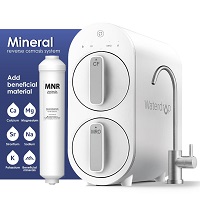Hair loss is a real problem that troubles many people. A great number of people, females with long hair, in particular, find a lot of hair on the bathroom floor drain every time after washing the hair.
The situation varies as the places change, such as moving, studying, or traveling in different areas or countries. In some places, people lose more hair, and in some places, people lose less. There’s a big chance that it has to do with the hardness of the water.
The situation varies as the places change, such as moving, studying, or traveling in different areas or countries. In some places, people lose more hair, and in some places, people lose less. There’s a big chance that it has to do with the hardness of the water.
What Is Hard Water?
The hardness of water refers to the concentration of salts dissolved in water, that is, the content of calcium salts and magnesium salts. The higher the content, the higher the hardness. GPG is the unit of water hardness, 1 GPG means that the content of hardness ions (calcium and magnesium ions) in 1 gallon of water is 1 grain.
According to the American WQA (Water Quality Association) standard, the hardness of water is divided into 6 grades: 0~0.5GPG is soft water, 0.5~3.5GPG is slightly hard, 3.5~7.0GPG is medium hard, 7~10.5GPG is hard water, 10.5~ 14.0GPG is very hard, and above 14.0GPG is extremely hard.
How Do I know If I Have Hard Water?
Hard water often contains minerals such as calcium and magnesium ions, which can interfere with the washing detergent or soap and leave water stains on dishes or water pipes. The following method is very simple and easy to operate, which will help you to test the hardness of the water.
Slowly pour in dish detergent. Add 5 or 10 drops at a time and shake the bottle. Pay attention to how many drops of soap you need to add to generate a lot of foam, which you can roughly judge the hardness of the water.
- 20 drops: slightly hard water
- 30 drops: medium hard water
- 40 drops: hard water
- Over 50 drops: super hard water
Although it cannot accurately measure the value, it provides a general judgment over the water hardness. If you are using well water, you can contact the local water authorities to check the water hardness.
According to a research report by Virginia Tech and Virginia State University, 85% of the water in the United States is hard water, while soft water is concentrated in New England, the Pacific Northwest, the Atlantic Gulf, and Hawaii.
Is Hard Water Bad For You?
Health problem
Many people who drink hard water might experience diarrhea and gastrointestinal disorders problems. Scientific studies show that drinking high-hardness water for a long time will cause diseases of cardiovascular, nervous, urinary, and hematopoietic. Health experts suggest that drinking water with a hardness of 150-450 mg/L is ideal to drink for human health.
Water scale
Water scale builds up on the inner wall of the kettle is also related to the hardness of the water. The kettle water scale will affect the thermal conductivity of the kettle and lead to wasted energy.
In addition, if industrial boilers use hard water, an uneven thermal insulation layer would be formed between the boiler wall and the water, which will cause overheating or uneven heating of the furnace wall, resulting in deformation of the furnace body and even explosion.
Laundry issues
Hard water is also bad for home chores like laundry. Washing clothes with hard water not only wastes soap but also makes the fibers brittle and easy to break.
How To Treat Hard Water?
Boiling
There are many ways to soften hard water. In daily life, boiling is usually used to reduce the hardness of water, but it cannot convert all soluble calcium and magnesium compounds into precipitates.
Chemical reaction
As we have mentioned above, washing detergent cannot form enough foam to achieve cleaning performance when used with hard water. You can lower the water hardness by adding substances like ammonia, borax, lye, or sodium carbonate. Adding one of these substances to the water can help increase the efficiency of washing detergent.
While the substances like ammonia don't soften water, they are known to prevent lime from interacting with soap and help with lathering. When using, carefully follow the warnings and instructions on the packaging.
Reverse osmosis
If you live in an area where the tap water hardness is high, then a reverse osmosis water purifier is recommended here. Using a reverse osmosis water purifier not only lowers the hardness of water and improves the taste of drinking water, but it can also filter large particles of impurities, heavy metals, bacteria, viruses in the water to create a healthy drinking water environment.
The core of the reverse osmosis water purifier is the reverse osmosis membrane, which the pore size of the membrane is nano-scale, meaning impurities, heavy metal ions, calcium, and magnesium ions larger than water molecules cannot pass through. The filtered water is almost pure water and can drink directly.
Waterdrop G2MNR Remineralization Reverse Osmosis Water Filter
The G2 MNR RO system is one of the best-selling systems on the market for its excellent filtration performance and easy installation process. The composite filter design allows the system to effectively filter out impurities and lower the amount of total dissolved solids (TDS) in water, which is the main source of water hardness. The TDS level can be easily tested using a TDS tester.
In addition to the water purification function, the remineralization feature of the system adds back minerals that are beneficial for human bodies. If you are concerned about the water you drink from an RO system is too “pure,” then this system is the ideal choice for you. With the external remineralization filter, you can enjoy safe drinking water with your health concern being taken care of.




